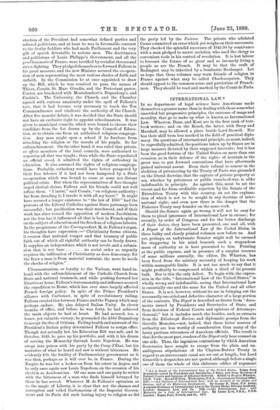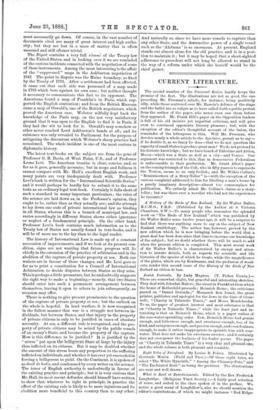INTERNATIONAL LAW.*
IN no department of legal science have Americans made themselves a greater name than in dealing with those somewhat unsettled but progressive principles, the outcome of usage and morality, that go to make up what is known as International Law. Wheaton, Dana, and Kent are in the first rank of text- book writers ; and on the Bench, the latter, with Story and Marshall, may be allowed a place beside Lord Stowell. Nor has their skill been less marked in the field of practical diplo- macy. On questions of international principle, as must, indeed, be regretfully admitted, the positions taken up by States are in large measure dictated by their supposed interests ; but it has been the good fortune of the United States on more than one occasion, as in their defence of the rights of neutrals in the great war, to put forward contentions that have afterwards gained universal assent. Even their refusal to concur in the abolition of privateering by the Treaty of Paris was grounded on the liberal doctrine, that the capture of private property at sea, whether by privateers or public vessels-of-war, is alike indefensible in principle. As against this, must be set the recent and far from creditable rejection by the Senate of the Extradition Treaty with this country, an act the explana- tion of which is not to be sought in any doctrine of inter- national right; and even now there is the danger that the Fisheries Treaty may founder on the same rock.
Should the Senate again go wrong, it will not be easy for them to plead ignorance of International Law in excuse ; for recently, by order of Congress and for the better discharge of their duties, they have been presented, one and all, with A Digest of the International Law of the United States, in three bulky and closely printed volumes now before us. And yet, perhaps, an unfortunate Senator might well be excused for staggering in his mind beneath such a stupendous mass of authority as is here presented to him. Printing at the public expense, and in presence of a surplus revenue of some millions annually, the editor, Dr. Wharton, has been freed from the salutary necessity of keeping his work within manageable limits. It is not too much to say that it might profitably be compressed within a third of its present bulk. Nor is this the only defect. To begin with, the expres- sion in the title, "International Law of the United Stites," is wholly wrong and indefensible, seeing that International Law is essentially one and the same for the United and all other States. It is not, however, without its use in bringing out the necessarily one-sided and defective character of a large portion of the contents. The Digest is described as drawn from "docu- ments issued by Presidents and Secretaries of State, and from decisions of Federal Courts and opinions of Attorneys- General;" but it includes much else besides, such as extracts from the Edinburgh Review, and diplomatic gossips from the Greville Memoirs,—not, indeed, that these latter sources of authority are less worthy of consideration than many of the hasty partisan utterances of American officials. The result is that, for the most part, readers of the Digest only hear counsel on one side. Thus, the ingenious contentions by which American Secretaries have sought to escape from the plain and un- ambiguous stipulations of the Clayton-Bulwer Treaty in regard to an interoceanic canal are set out at length ; but Lord Granville's despatches are not quoted, although before a single one of them the whole of this elaborate edifice of argument
• (1.) A Digest of the International Law of the United States. Taken from Documents honed by Presidents and Secretaries of State, and from Decisions of Federal Courts and Opinions of Attorney.Generals. Edited by Francis Wharton, LL.D. 3 vols. Second Button. Washington, U.S.A. : Government Printing Moe. 1587.—(2.) Outlines of International Law with an Account of its Origin and Sources, and of its Historical Development. By George B. Davis, U.S. Army, A.ssistant-Protessor of International Law at tho 'United States Military Academy. London : Sampson Low and Co. 1898.—(3.) International Low: with Materials for a Code of International Law. By Leone Lis', F.S.A., F.S.S. London : Kegan Paul, Trench, said Co. 180.
must necessarily go down. Of course, in the vast number of documents cited are many of great interest and high autho- rity; but they are lost in a mass of matter that is often unsound and still oftener trivial.
The Digest contains a very full resum4 of the Treaty law of the United States, and in looking over it we are reminded of the curious incidents connected with the negotiation of some of these instruments. Among the most interesting is the affair of the " suppressed " maps in the Ashburton negotiation of 1842. The point in dispute was the Maine boundary, as fixed by the Treaty of 1783. After a settlement had been effected, it came out that each side was possessed of a map made in 1783 which bore against its own case ; but neither thought it necessary to communicate this fact to its opponent. The Americans found a map of Franklin's in Paris, which sup- ported the English contention ; and from the British Museum came a map of Oswald's, one of the British negotiators, which proved the American case. Webster wilfully kept back the knowledge of the Paris map, on the not very satisfactory ground that it was open to the English to find it in Paris, if they had the wit to look for it. Oswald's map somehow or other never reached Lord Ashburton's hands at all ; and its existence was only revealed to Parliament for the purpose of mitigating the discontent which Webster's sharp practice had occasioned. The whole incident is one of the most curious in diplomatic history.
The latest text-books on the subject are from the pens of Professor G. B. Davis, of West Point, U.S., and of Professor Leone Levi. The American treatise is clear, concise, and, so far as it goes, generally accurate; but in scope and fullness it cannot compare with Mr. Hall's excellent English work, and many points are very inadequately dealt with. Professor Levi's book is written for the "International Scientific Series," and it would perhaps be hardly fair to submit it to the same tests as an ordinary legal text-book. Certainly it falls short of such a standard in many important particulars; the rules of the science are laid down as, in the Professor's opinion, they ought to be, rather than as they actually are; and the attempt to lay down one code of private international law as binding in all States, whereas this is a branch of municipal law, and varies accordingly in different States, shows either ignorance or neglect of a fundamental principle. On the other hand, Professor Levi's book contains much information as to the Treaty law of States not usually found in text-books, and it will be of more use to the lay than to the legal reader.
The history of International Law is made up of a constant succession of improvements, and if we look at its present con- dition, signs are not wanting that future progress will lie chiefly in the extension of the practice of arbitration and in the abolition of the capture of private property at sea. Both our writers are in favour of these changes, and Mr. Levi goes so far as to print a constitution for a Council of International Arbitration, to decide disputes between States as they arise. This is perhaps a little premature, but he undoubtedly suggests the right way to make a beginning,—namely, that two States should enter into such a permanent arrangement between themselves, leaving it open to others to join subsequently, as occasion may offer.
There is nothing to give present prominence to the question of the capture of private property at sea ; but the outlook on -the whole is hopeful. In land warfare, it is now recognised in the fullest manner that war is a struggle not between in- dividuals, but between States, and that injury to the property of private citizens is only to be justified in cases of absolute necessity. At sea, a different rule is recognised, and the pro- perty of private citizens may be seized by the public vessels of an enemy's State, and become the property of the captors. How is this difference to be justified ? It is justified by the " stress " put upon the belligerent State at large by the injury thus infficted on its citizens. But it may be doubted whether the amount of this stress bears any proportion to the suffering inflicted on individuals, and whether it has ever yet succeeded in forcing a belligerent to yield. On the Continent, it is spoken of as droit de butin, and condemned by every writer on the science. The tenor of English authority is undoubtedly in favour of -the existing practice and principle; but it is very curious that Mr. Hall, its most recent defender, should himself have written to show that, whatever be right in principle, in practice the effect of the existing rule is likely to be more injurious and its abolition more beneficial to this country than to any other.
And naturally so, since we have more vessels to capture than any other State, and the destructive power of a single vessel such as the 'Alabama' is so enormous. At present, England stands out almost alone for the old practice, and is in a posi- tion to maintain it ; but it may be hoped that a short-sighted adherence to precedent will not long be allowed to stand in the way of a reform under which she herself would be the chief gainer.







































 Previous page
Previous page